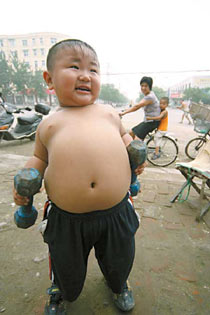
An overweight 4-year-old boy surnamed Wu in
Xuchang, Central China's Henan Province, shows his prowess by lifting
5-kilogram dumbbells without difficulty. Wu, who tips the scales at 39.5
kilograms, is roughly twice the normal weight of a child his age. [China
Daily] |
Obesity is becoming one of the biggest
threats to children's health, a recent nationwide investigation has warned,
pointing out that students' physical indicators are declining because of a lack
of enough exercise.
The past five years have witnessed fast growth in the number of fat children
in some big cities, the number has even doubled, the survey showed.
In Beijing, for example, latest figures from the local education authorities
show that the height, weight and chest measurement of young students keep
expanding, while physical indices, such as lung capacity, speed and strength,
are going down.
The blood pressure of half the secondary school students is above normal; and
the number of obese students has increased by 50 per cent compared with five
years ago.
In the urban areas of Beijing and five other economically more developed
regions, the average obesity rate of male students in primary schools has
reached 12.9 per cent.
Nationwide, the obesity rate of children is 8.1 per cent and 3.1 per in urban
and rural areas.
"China has entered the era of obesity," Beijing-based Workers' Daily quoted
Ji Chengye of the Child and Adolescent Health Section of the China Preventive
Medicine Association as saying. "Childhood is the first age group affected by
obesity, to which society has not paid enough attention," Ji said. "Obesity in
childhood will influence health for life," the expert added.
The increase in indoor activities, such as watching television, surfing the
Internet, playing computer games or doing homework, is one of the main reasons
for children's obesity, according to Ji, because it means lack of exercise and
little chance for burning calories.
Another reason is consumption of excessive junk food. "In the past, children
used to drink water. Now they prefer sweet beverages; and some have totally
given up water," Ji said. He also blamed intensive promotions of sweets and junk
food, which make it hard for children to resist the temptation.
Also, because of pressure of competition to enter good higher schools,
teachers sacrifice students' physical exercise time for classes.
For instance, about 60 per cent of school masters in Beijing admitted that
the one hour of outdoor physical exercises per day is not always followed.
"Problems of obesity will not only influence children's physical and
psychological development, but also become a 'time bomb' for the country's
future economic development and public health system," said Chen Chunming, head
of International Life Sciences Institute Focal Point in China.